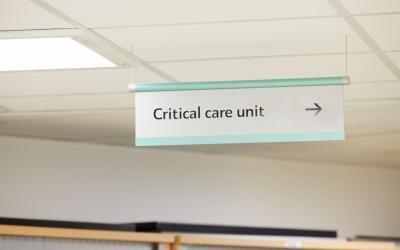Understanding the responsibilities of hospital administrators

When discussing quality health care, the conversation typically focuses on doctors, nurses, and other healthcare professionals who provide direct patient care and medical treatments. What’s often overlooked, though, is the invaluable role healthcare administration teams, and their processes, play in supporting:
- patient care
- healthcare facilities
- operational efficiencies.
“It is hard to imagine how the NHS would function without its administration (admin) processes,” says the King’s Fund, an independent healthcare think-tank. “These processes work – often behind the scenes – to make sure patients, staff, information and equipment are all in the right time and place to ensure high-quality health care.”
The role of healthcare administration teams
At the heart of every successful healthcare institution lies a competent and dedicated administration team. These professionals are responsible for overseeing the day-to-day operations of hospitals, clinics, and other healthcare facilities and work environments. The administration team acts as a liaison between the medical profession and the business side of the health care system, ensuring both aspects work harmoniously to deliver the very best patient care.
These professionals will wear various hats, serving as strategic planners, financial overseers, and human resource managers. And they collaborate with medical professionals, such as doctors and nurses, to create environments that foster excellent patient care.
Key responsibilities of healthcare administrators
The responsibilities of healthcare administrators are diverse and demanding, requiring a multifaceted skill set to effectively navigate the complexities of healthcare.
“NHS administrative staff provide business support to clinical and non-clinical staff,” the NHS Health Careers website explains. “The NHS has to be well-organised and keep detailed records of patients and staff. Patients and other organisations need to be able to contact the NHS, to see or speak to the right person who can give them the help they need. That could be booking an appointment, getting advice or paying an invoice.”
Some of the key responsibilities of healthcare administrators include:
- Managing medical records. Healthcare administrators oversee the organisation and maintenance of patient medical records, ensuring their accuracy, security, and compliance with privacy laws. This may include both digital and traditional paper-based record keeping.
- Supporting the coordination of patient care. Healthcare administrators play an important role in coordinating patient care within their respective medical facility, ensuring medical services are delivered efficiently and effectively. This involves liaising with medical practitioners, nursing staff, and other healthcare professionals, as well as patients.
- Assisting with budgets and finances. Administrators support with budgeting, allocating resources, and ensuring financial sustainability for their area of the healthcare system. This involves everything from expenses and reimbursement processes to working with health insurance companies and addressing financial challenges.
- Human resource management. Human resource administrators support with recruitment, training, and the development of both medical and non-medical staff, and help to ensure adequate staffing levels within the service.
- Ensuring legal and regulatory compliance. Staying informed about legal requirements, regulations, and compliance standards is crucial. Administrators help to ensure healthcare providers operate within legal boundaries, and mitigate risks associated with malpractice and other legal issues.
Typical administrator roles in the NHS include:
- clerks
- health records staff
- receptionists
- secretary/typists
- medical secretary/personal assistants
- telephonist/switchboard operators
- human resource administrators
- administration managers
- general office managers
- office managers
- health services managers
- specialist administrators
Common requirements for careers in healthcare administration
According to NHS Health Careers, any admin role in the service requires a good standard of both literacy and numeracy. Typical requirements included in an health administrator job description include:
- GCSEs (or equivalent) in English and Mathematics
- IT skills or qualifications due the IT-based systems the NHS uses
- time management, organisation, and communication skills.
Other useful skills include problem-solving and strategic thinking, while those pursuing leadership must be adept at managing teams, handling financial responsibilities, and understanding the legalities around healthcare and medical practice.
A bachelor’s degree in a relevant field, such as health administration or business administration, can be useful for entry-level roles, while advanced degrees, such as a master’s degree in hospital administration or healthcare management, can help with career advancement opportunities.
The future of healthcare administration
As the healthcare landscape continues to evolve, so too will the role of hospital administrators. Several factors are likely to shape the future of healthcare administration and influence how administrators can tackle challenges – and contribute to better medical care.
Trends include:
- Advancements in technology. The integration of technology into healthcare services is expected to play a significant role in shaping the future of healthcare administration. Electronic health records, telemedicine, and data analytics are all becoming increasingly important tools for administrators in managing patient care and optimising health outcomes.
- Population health management. Healthcare administrators will play an important role in ongoing population health management, which focuses on an increasingly joined-up approach to preventive care, wellness initiatives, and community outreach. This shift towards a more holistic approach to public health will require administrators who can collaborate with various stakeholders and adapt their strategies accordingly.
- Global health challenges. Healthcare administrators will face the ongoing challenge of navigating global health issues, such as pandemics and infectious diseases. And building a more resilient healthcare system – and crisis management strategies – will be a collective goal for administrators and medical professionals alike.
Prepare for a career in healthcare management
Advance your career in healthcare and help create better health and social care experiences with the 100% online MSc Healthcare Management at Queen Margaret University. This flexible postgraduate programme is delivered entirely online, so you can learn from anywhere in the world and complete your studies around your current professional and personal commitments.
The master’s programme aims to prepare students for work in the field of healthcare management in the UK and beyond. Utilising both expertise in management and health, the programme will equip you with critical analytics skills and some practical skills as well as the theoretical knowledge needed for professional practice within healthcare management, both public and private sector. Through your programme modules, you will build your knowledge in areas such as health systems and policy, human resources management, organisational leadership, accounting, and data analytics and decision-making.

















The information below is required for social login
Login to your Account